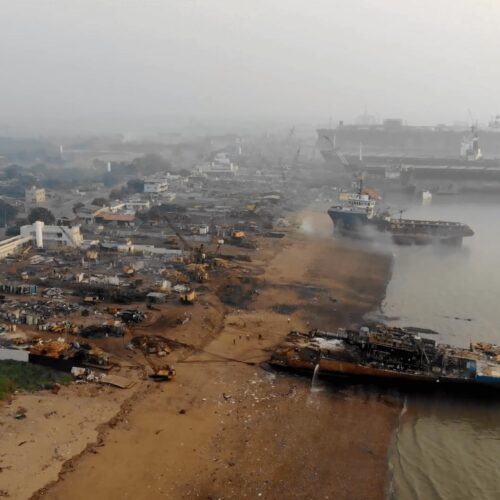Press Release – Recent fires at Gadani yards prompt authorities to shut down all shipbreaking activities
NGOs call for the relocation of the industry to facilities equipped for safe and clean recycling
On 11 October a tanker caught fire at the Gadani shipbreaking beach that holds a deplorable record of life threatening accidents. Fortunately, no casualties were recorded. Only a few days later, on 14 October, yet another oil tanker named KRITI (IMO 9270737) caught fire, this time injuring seven workers, three of which are in a critical condition.
The Platform has reported a series of accidents following the catastrophic explosion that killed at least 29 workers and injured 58 on the 1st of November 2016. Since then, there have been at least five more fires caused by unsafe cutting operations. Difficult access for firefighters, a severe lack of ambulances and no hospital in the close vicinity of the yards aggravate the conditions, as reported by trade unions.
Following the major blast in 2016, Pakistani authorities imposed a ban on the import of tankers in addition to a ban on cutting operations. The ban on import was however lifted in April 2018 after 18 months’ freeze. Due to the use of the low-cost method of beaching and the favorable steel market conditions, the Gadani yards offer high prices for end-of-life ships, and soon 22 tankers were waiting for the cutting ban to also be repealed. One local breaker nonetheless started scrapping the VLCC ADA before the authorities lifted the cutting ban, and a fire erupted onboard the tanker in July. Despite the accident, and the fact that few measures had been put in place to ensure safe working conditions, the government issued cutting permissions in late August, putting the life of the workers in danger and prompting the import of additional vessels.

In contrast to the fire that broke out in July onboard a vessel that had not received cutting permission, the Balochistan Environmental Protection Agency (EPA) had approved the breaking of both vessels that caught fire last week. The two accidents underpin that not only the ship owners and yard operators fail to take necessary precautions, but also that the Balochistan EPA acted negligently when approving the work to start. Fires occur when vessels that are not properly cleaned from highly inflammable residual oil are cut with blowtorches.


Related news

Platform publishes South Asia Quarterly Update #20
There were a total of 122 ships broken in the third quarter of 2019. Of these, 73 ships were sold to the beaches of South Asia for dirty and dangerous breaking.
... Read More
Press Release – NGOs urge Greece and Bangladesh to stop illegal beaching of ferry
Yet another passenger ship is heading towards the shipbreaking beaches of South Asia, in clear violation of European rules that are aimed at preventing the trade of… Read More

Press Release – One year later and no lessons learned at gadani as Aces is set aflame – again!
Shipbreaking plot no. 54 in Gadani, Pakistan, was sealed off yesterday after a massive fire broke out on-board the ship ACES (IMO 8021830). This is the same… Read More

Platform News – Surge of fatal accidents in Chittagong
At least five shipbreaking workers have been killed and five more severely injured in a series of fatal accidents in Bangladesh in one month only. On… Read More

Press Release – Norwegian Altera Infrastructure fined for beaching two ships in India
Økokrim issued a fine of NOK 8 million on 10 June to shipping company Altera Infrastructure for having sold two vessels for scrapping India.
... Read More
Platform News – NGO Shipbreaking Platform awarded grant by Royal Academy of Engineering and Lloyd’s Register Foundation
Engineering X has awarded nearly £1 million in grants to projects aimed at tackling challenges of decommissioning ships and offshore structures.
... Read More
Platform News – Performance With Bare Hands (Live) in Brussels
The NGO Shipbreaking Platform invites you to attend the artistic performance With Bare Hands (Live) on Friday 21 June in Brussels (Belgium).
... Read More
Platform News – Maersk maintains beaching mantra and chooses to ignore facts revealed by Danwatch
After investigative journalists have revealed the severe short-comings of Maersk’s shipbreaking practices in Alang, India, the shipping giant blatantly disregards the findings. In an official statement, Maersk… Read More
